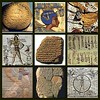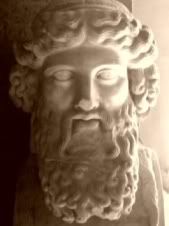All Things Bright And Beautiful And The Noble Lie
"All Things Bright And Beautiful" is a song that many people know from Sunday School or from church. The poem was written by an irish woman, Cecil Frances Alexander in the mid 1800s.
The first verse goes like this:
All things bright and beautiful,
All creatures great and small,
All things wise and wonderful,
The Lord God made them all.
Many people are familiar with most of the verses of this favourite hymn. They are not so familiar with this particular verse which has been omitted in modern times.
The rich man in his castle,
The poor man at his gate,
God made them, high or lowly,
And ordered their estate.
From: "All Things Bright And Beautiful"
Oh dear, god made people deliberately poor and deliberately rich? And he ordered their estate? "Estate" in this sense doesn't refer to land but to a person's social status or rank. So, god made some people poor and some people rich and he ordered that this would be their social status, rank or class in life. A song with a verse like that in it was probably enough to set off a revolution or two. Maybe the Russian Revolution(1917) for argument's sake.
Those of you are slightly familiar with Plato's 'Republic' might now guess where I am going with this. Plato was a greek philosopher (427BCE–347 BCE), who wrote two seminal works. "Seminal" as in - highly original and influencing the development of future events not "seminal" as in - relating to semen. (Though in retrospect, the "semen reference" is also pertinent).
These two major works are 'The Republic' and 'The Laws.' 'The Republic' contains virtually the entire universe of Plato's philosophy. So if you want to find out why, and how Plato thought the world should be organized, you read 'The Republic.'
In 'The Republic', Plato describes a city whose inhabitants were organized into categories:
- 1. The Rulers
- 2. Auxiliaries
- 3. Farmers etc.
The Rulers, Plato said, would be chosen from the military elite (called Guardians) because they were good at shepherding and caring for the interest of the community. The Auxiliaries would be Guardians in training. The Rulers, Plato said, must tell the people of the city "The Noble Lie" - that the categories of Rulers, Auxiliaries, Farmers, etc. was NOT due to circumstances within the people's control, upbringing, or education, but because of god's intervention. God, the Noble Lie went, had put gold, silver, and iron into each person’s soul, and those metals determined where a person's station was in life was. (Naughty, naughty Plato - *smack *smack.)
The Lie is necessary, Plato argued, in order to keep a stable social structure. In Plato’s mind, The Noble Lie is a religious lie that’s fed to the masses to keep them under control and happy with their situation in life. Plato did not believe most people were smart enough to look after their own and society’s best interest. The few smart people of the world needed to lead the rest of the flock, and The Noble Lie was designed for that purpose.
Now I suppose you see where the verse from "All Things Bright And Beautiful" fits in. It appears to mirror the philosophy in Plato's Republic. The people must be told that their position in life, their estate, was preordained by god. This Noble Lie keeps the masses subservient and obedient, so their betters can get on with ruling the world as they see fit.
Now those of you, the scarce few of you, who have received a good "liberal education" probably know about the Noble Lie, Plato and god's gold, silver and iron class structure, but with "liberalism" such a dirty word these days, it would be fair to guess that the majority of people do not.
How many people live in a matrix woven by Plato's noble lie? Millions, I guess. It enables kings, queens, emperors, presidents and prime ministers to rule unhindered, in the main by the masses. The mass of believers are too busy believing that it is god's will that they have cancer or diabetes. Or that it is a god's will that they are poor or ignorant. This, they are led to believe, is for the good of their eternal souls. Implicit in this belief is the assumption that by accepting these circumstances, they will be rewarded in heaven for their earthly suffering.
Now, why was that verse in "All Things Bright And Beautiful" ommitted in recent times? Maybe it was ommitted because it was counter-productive to the intention. If the intention was/is to keep people, ignorant, subservient and obedient to their masters, it is best if the intention is not blasted at them through a bullhorn or sung to them repeatedly in a hymn. Tellng people they are to accept their lot in life in order to preserve the social order, just might start a revolution or something.
Mind you, it has a kind of delicious irony about it if people are encouraged to sing such a verse and brainwash themselves into subservience at the same time. Mission Accomplished.
"The aim of liberal education is to create persons who have the ability and the disposition to try to reach agreements on matters of fact, theory, and actions through rational discussions." - Andrew Chrucky
plato , noble lie , noble , lie , republic , the republic , all things bright and beautiful , hymns , liberalism , liberal education




















14 Comments:
I did not know about that verse.
Of course, the best response to that song is Monty Python's:
All Things Dull and Ugly
All things dull and ugly,
All creatures short and squat,
All things rude and nasty,
The Lord God made the lot.
Each little snake that poisons,
Each little wasp that stings,
He made their brutish venom.
He made their horrid wings.
All things sick and cancerous,
All evil great and small,
All things foul and dangerous,
The Lord God made them all.
Each nasty little hornet,
Each beastly little squid--
Who made the spikey urchin?
Who made the sharks? He did!
All things scabbed and ulcerous,
All pox both great and small,
Putrid, foul and gangrenous,
The Lord God made them all.
Amen.
RE drake:
Yes RAmen.
What you are describing sounds a lot like communism to me.
And what is ‘RAmen’ supposes to mean?
Daniel
Beep, you really are a nice but wicked woman! And yes, I used to sing that song in primary school.
Of course, it could be argued that, if all people are suddenly released from an over-riding system, no matter how flawed and unfair, how will they handle the absolute freedom and the billion choices that have to be made for which they are responsible.
Cheers!
I had neither heard that verse or the verses drake has provided. Drake, those are classic.
Of course if you can make people believe their lot in life is unchangeable, they will not think for themselves or try to change their lot. Total control follows.
People of religion live in fear of missing the great reward that comes with death. Rather than face reality and do what is right for themselves and everyone around them, they aim only at paying their heaven insurance each Sunday in the plate at church. So much energy wasted on trying to go to heaven that a lot of people seem to miss the opportunity of life.
RE patricia:
The song "All Things Dull and Ugly" is a parody of the song "All Things Bright and Beautiful" by Monty Python.
Monty Python's Flying Circus was an english comedy group.
One of their other popular songs was "Every Sperm is Sacred", which was a comment essentially on the catholic church's position on contraception.
RE daniel:
RE: "Of course, it could be argued that, if all people are suddenly released from an over-riding system, no matter how flawed and unfair, how will they handle the absolute freedom and the billion choices that have to be made for which they are responsible."
Firstly, I don't think it is desirable to legislate against religious beliefs, but I would hope for a change in focus, over time, from a religious model based in faith to a philosophical model based in reason.
Considering the "Age of Reason" is in its infancy, (origin - 17th century), we probably have thousands of years before religious beliefs as we now know them, become a minor part of human life.
That is, as long as human beings don't kill each other all off in irrational attempts to preserve their respective religious beliefs.
RE anonymous daniel:
What sounds like communism?
RE: RAmen
In ancient Egypt people believed the Sun was the emblem of the Creator. They called the sun Ra, and all other gods and goddesses were forms of the Creator.
One of these gods was Amen. Amen was an invisible, hidden and mysterious god named Amen, Amon, Amun, Ammon.
Over time, Amen progressed from being a minor god to the national god of southern Egypt. He became known as Amen-Ra, the supreme form of God the Creator. By the 18th Dynasty (approximately 1539-1295 BCE), a college had been established to study Amen-Ra and as a focal point for worship.
The Jews had settled in Egypt for approximately 400 years and during this time they would have been exposed to the worship of Amen-Ra.
By the time of their exodus from Egypt, The word "amen" would certainly be in their language and part of their cultural and religious experiences.
From the Jews, the word was adopted by Christians, Muslims and others.
So Amen was originally the name of an egyptian god, who evolved into Amen Ra, the supreme god and creator, who was personified by the sun. (Ra)
Sometimes you will find non-believers, like me, who will reference the origin of the word "amen" by simply stating RAmen.
The word "Amen" for the invisible, all powerful egyptian god, and "RA" the personification of this god as the sun.
So RAmen.
It's my fear that the latter will occur, Beep!
Beep, I knew the python deal was a parody, I just had never heard it before.
RE patricia:
Sorry, I had a desire to overexplain.
Didn't know about that Beep, ta...
Cool Post - I like the quote :)
http://www.thenoblelie.com
Post a Comment
<< Home